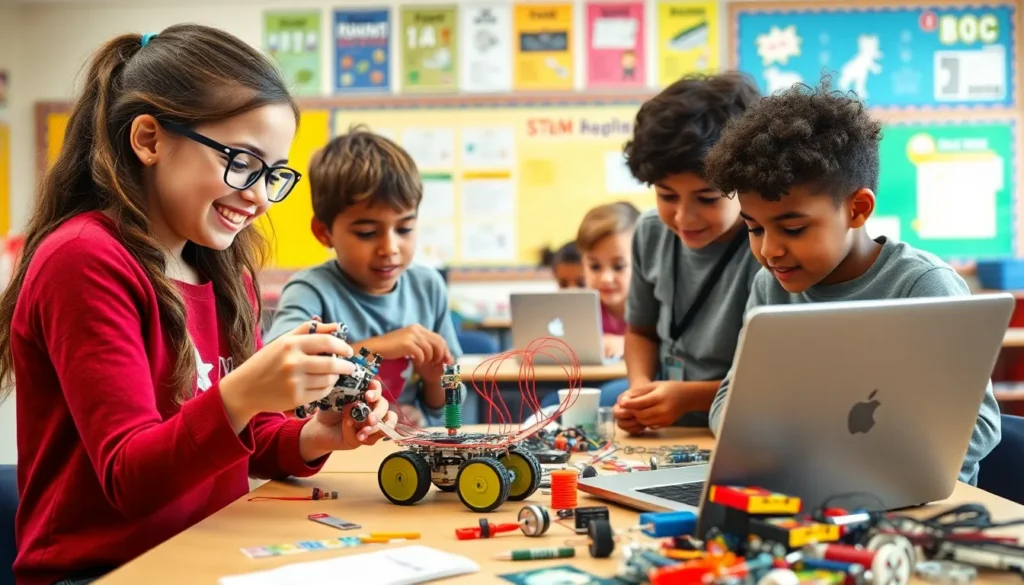Table of Contents
ToggleIn a world where curiosity fuels innovation, science clubs are the secret laboratories where future Einsteins and Curie enthusiasts unite. Imagine a place where bubbling beakers and explosive experiments are the norm, not a scene from a quirky sitcom. These clubs offer a thrilling escape from the mundane, transforming science from textbook boredom into hands-on excitement.
Overview of Science Clubs
Science clubs create vibrant environments for young enthusiasts. They offer opportunities to explore and engage with science through hands-on experiences. Members participate in experiments that transform traditional learning into exciting discoveries. Various activities ignite curiosity, whether it’s building robots, conducting chemistry experiments, or exploring environmental science.
Clubs often organize events such as science fairs and workshops. These events showcase the skills learned throughout the year. Collaboration fuels creativity, as members work together to solve problems and develop projects. Mentorship from teachers or community scientists enhances knowledge and skills.
Many science clubs emphasize interdisciplinary approaches. They incorporate aspects of mathematics, technology, engineering, and arts. By blending different fields, clubs foster holistic understanding and innovative thinking. Workshops may include coding sessions, engineering challenges, or art installations inspired by science.
Clubs typically meet weekly or bi-weekly. Regular meetings provide consistent engagement, allowing members to share new ideas and collaborate on ongoing projects. Some clubs may also team up with local universities or organizations. These partnerships expand resources and expertise, enriching the club’s offerings.
Funding often plays a crucial role in the success of these clubs. Clubs may seek sponsorship from local businesses or apply for grants to support their activities. Successful fundraising efforts enable the purchase of equipment and materials that enhance the learning experience.
Science clubs not only build knowledge but also foster friendships. Through shared interests, members create a strong sense of community. Bonds formed in these settings can lead to lifelong connections and inspire future collaborations in science.
Benefits of Science Clubs

Science clubs provide numerous benefits that extend beyond traditional learning. Members gain hands-on experience in various scientific fields, which fosters an understanding of complex concepts.
Skill Development
Skill development is a primary advantage of science clubs. Participants engage in activities that enhance critical thinking and problem-solving skills. Members gain proficiency in scientific methods, enabling them to design experiments and analyze data. Involvement in projects often requires teamwork, which cultivates communication and collaboration skills. Exposure to technology, coding, and engineering concepts builds technical competencies. Experiences like these prepare members for future academic and professional pursuits in STEM.
Social Interaction
Social interaction thrives in science clubs. Members build friendships through shared interests and collaborative projects. Group activities promote team spirit and encourage open communication among participants. Regular meetings foster a sense of belonging and community, connecting individuals with similar passions. Engaging with peers enhances emotional intelligence and interpersonal skills. These social connections often lead to networking opportunities, which can benefit members in their future educational and career endeavors.
Types of Science Clubs
Science clubs come in various forms, catering to different interests and demographics. Each type offers unique opportunities for members to explore scientific concepts and collaborate on projects.
School-Based Clubs
School-based clubs usually function within educational institutions. Students meet regularly to engage in hands-on experiments and projects. These clubs often provide resources from teachers and partnerships with local organizations. Activities can include science fairs, guest lectures, and competitions. Members build camaraderie while enhancing their understanding of diverse scientific fields.
Community Science Clubs
Community science clubs often welcome individuals of all ages. These clubs aim to foster a love for science outside traditional classroom settings. Participants can engage in activities like nature hikes, local environmental studies, or science-themed workshops. Members frequently collaborate on community projects that raise awareness about science-related issues. Such clubs often network with local universities, providing access to expert resources.
Online Science Clubs
Online science clubs thrive in the digital space. Virtual platforms allow members from different locations to collaborate on scientific projects. These clubs often host webinars, interactive discussions, and virtual experiments. Flexibility in scheduling makes participation accessible for varying time zones. Online communities foster diverse connections, creating opportunities for sharing ideas and resources across the globe.
Activities in Science Clubs
Science clubs offer diverse activities that spark interest and engagement in scientific concepts. Members often immerse themselves in hands-on experiences that enhance learning.
Experiments and Projects
Experiments and projects form the core of many science club activities. Students conduct chemistry experiments that illustrate chemical reactions and principles. Building robots showcases engineering principles and fosters teamwork. Participants may also design experiments to test environmental hypotheses, instilling a sense of inquiry. Group projects promote collaboration, allowing members to exchange ideas and troubleshoot challenges together. Observing the practical application of scientific theories builds confidence and strengthens retention of complex concepts.
Field Trips and Workshops
Field trips and workshops provide members with real-world scientific exposure. Visits to local laboratories or research institutes allow participants to engage with professionals and observe experiments firsthand. Workshops vary from hands-on experiments to expert-led lectures, enriching understanding and sparking new interests. Activities like nature hikes enable exploration of ecosystems and biodiversity. Each outing reinforces the value of experiential learning, fostering curiosity and a deeper connection to science. Engaging with community resources enhances skills while providing a broader perspective on scientific applications.
Science clubs play a vital role in nurturing the next generation of scientists. They provide a dynamic platform for exploration and creativity where members can engage in hands-on activities. The collaborative environment fosters friendships and a sense of community that extends beyond the club itself.
Through various projects and events, participants not only gain practical experience but also develop essential skills that prepare them for future challenges. Whether in school, the community, or online, these clubs inspire curiosity and a lifelong love for science. Embracing the diverse opportunities offered by science clubs can lead to transformative experiences that shape young minds and pave the way for future innovations.







